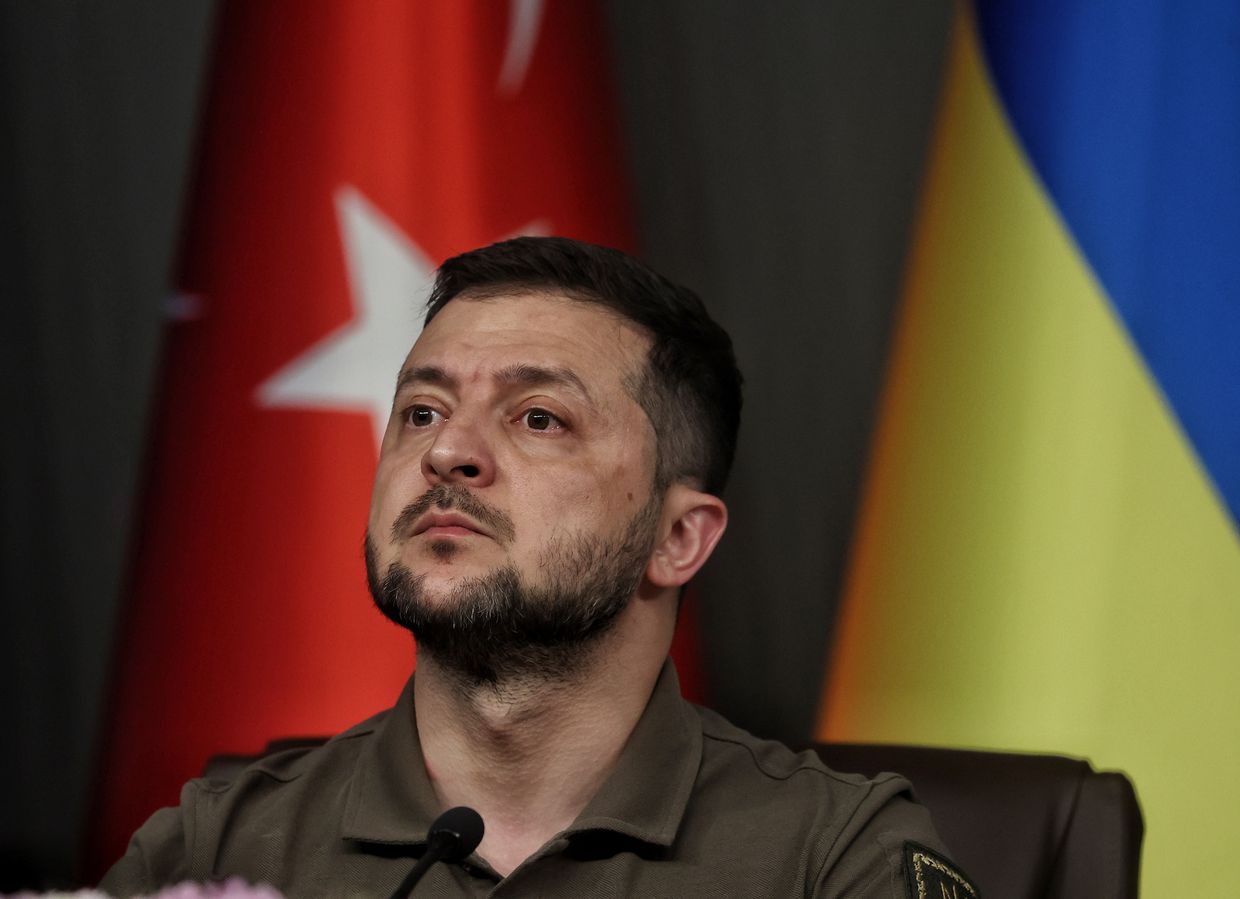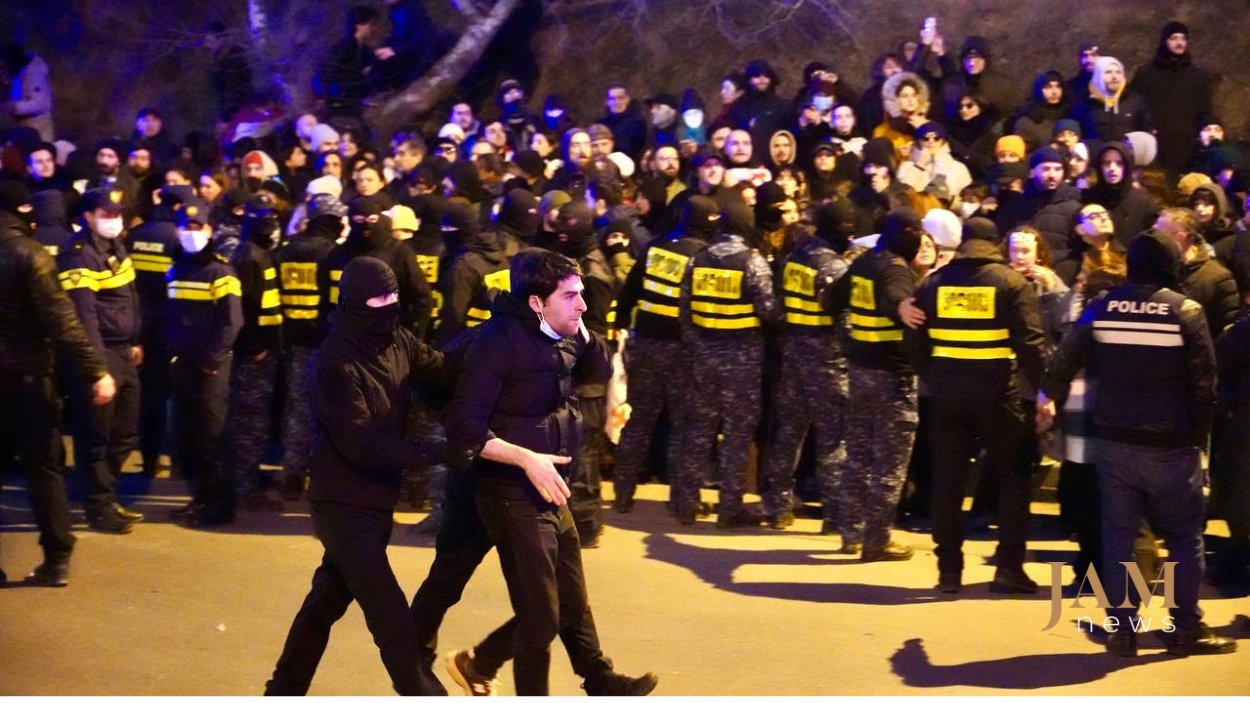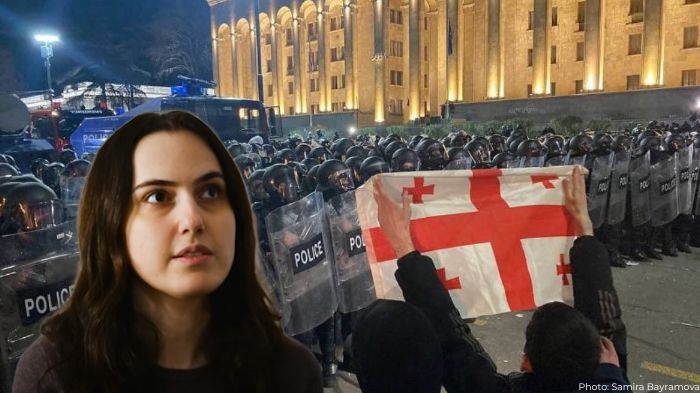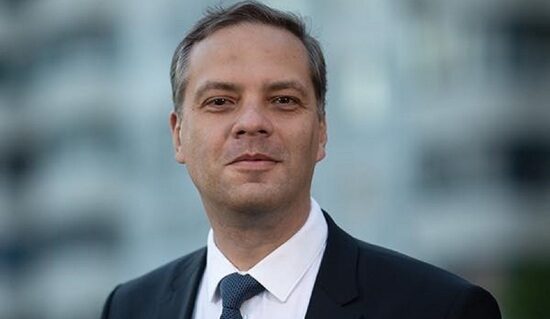Vue lecture
“I was not fierce enough”: Georgian activist’s brutal confession as democracy collapses

“We fucked up.” It’s not often you hear a democracy activist open with those words, but Nino Robakidze, a veteran democracy activist with over 15 years fighting for Georgian freedom, isn’t interested in pretty narratives.
Speaking at the “FuckUp Night” panel at the Lviv Media Forum 2025, Robakidze laid bare how Georgian civil society enabled the fastest documented democratic collapse in modern European history.
The timeline is breathtaking: December 2023, Georgia receives EU candidate status. Eighteen months later, dozens of political prisoners, including four high-profile politicians, fill Georgian jails, independent media faces criminal prosecution, and the government has abandoned European integration entirely. Over 200 public servants were fired simply for posting pro-European statements on Facebook.
“Georgian civil society is in a perfect storm,” she says. “We saw the red flags. We really saw the red flags. But it was so uncomfortable to really talk about that.”

From EU dreams to Russian nightmare in record time
Twenty-one years after the Rose Revolution promised Georgia a European future, the country has achieved something unprecedented: the fastest documented slide from EU candidate to authoritarian crackdown in European history.
The timeline is breathtaking.
- December 2023: EU grants Georgia candidate status.
- May 2024: Government passes Russian-style “foreign agent” law.
- October 2024: Elections marked by widespread fraud.
- November 2024: Government suspends EU talks.
- January 2025: First female journalist political prisoner.
The halt to EU accession talks were the straw that broke the camel’s back. Polls show 80% of Georgians want EU membership—one of the highest rates in any candidate country.
What followed was six months of non-stop protests across Georgia—unprecedented in the country’s history. Police have violently dispersed demonstrators using water cannons and tear gas against crowds singing the EU anthem.
Hundreds have been arrested, including Mzia Amaglobeli, co-founder of independent outlets Batumelebi and Netgazeti, who faces up to seven years in prison for symbolically slapping a police chief after he allegedly spat in her face and verbally abused her. She became Georgia’s first female journalist to be designated a political prisoner.
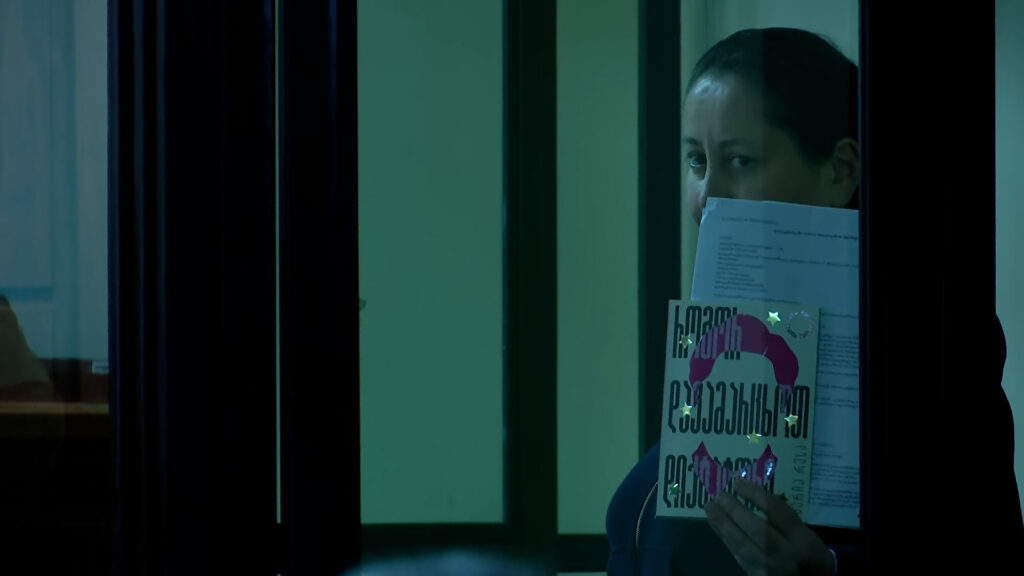
But Robakidze, former Country Director for IREX Georgia, isn’t just analyzing the crisis—she’s dissecting how democracy defenders like herself enabled it through a fatal dependency that made Georgian freedom hostage to foreign funding.
For two decades, the US government poured millions into Georgian civil society—building the independent media, NGOs, and democracy programs that became the envy of the former Soviet space. That investment created something genuinely remarkable: a vibrant civil society that helped Georgia become a beacon of democratic progress in the region.

From Rose Revolution to “Russian Dream”: Georgia at breaking point with pivotal pro-EU protests
The fatal dependency: how Western money created the weapon to destroy democracy
For two decades, Georgian civil society lived on life support: US government funding. Independent media, NGOs, democracy programs—all relied heavily on American largesse because local businesses feared government retaliation for supporting critical outlets.
“This was mainly the US government funding because there was not enough advertising money in independent media,” Robakidze explains. Vulnerable to state pressure, “big business did not want to work with media outlets like this because they were investigating government corruption.”
The dependency created a catastrophic vulnerability. When Georgian Dream wanted to crush civil society, they had a ready-made weapon: the “foreign agent” narrative borrowed directly from Putin’s playbook.
But the irony runs deeper—and darker. Western funding didn’t just create the vulnerability; it actively trained the oppressors.
Georgian Dream created Western-funded strategic communication units across government ministries. “And then this communication in the crisis, when the crisis was approaching, was used against those who were actually protecting Western values—civil society, media, free media, etc.”
The absurdity was complete: civil society trained its own oppressors. “We were inviting representatives of this group to different trainings, on strategic communication, on public opinion research, and they learned the lesson really well. Maybe they were the best in their class, actually.”
The students became the masters, using Western-funded skills to dismantle Western values.
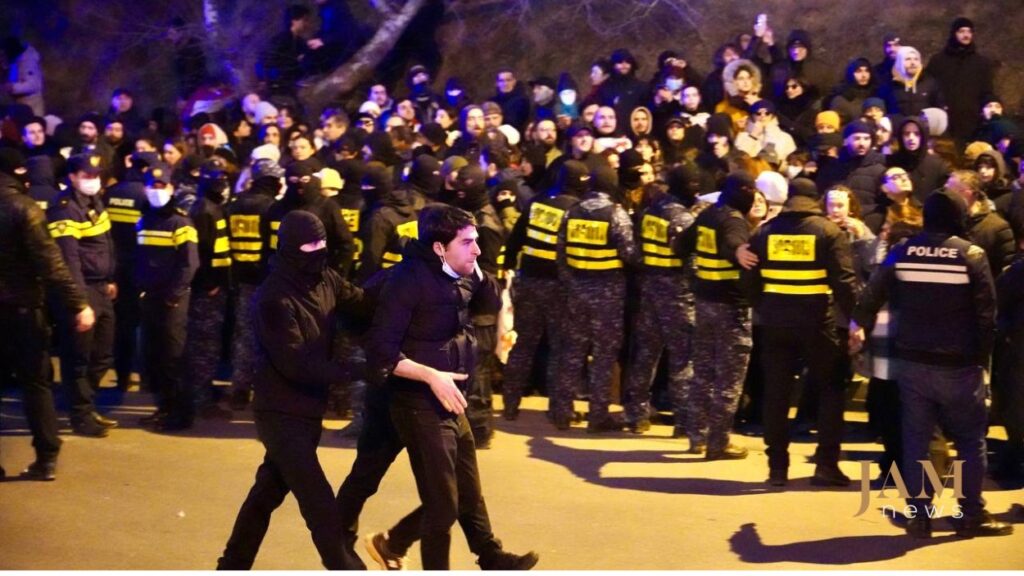
Playing fair while opponents cheated
Civil society’s commitment to democratic norms became another vulnerability. While democracy defenders insisted on fact-checking, verification, and due process, their opponents weaponized speed and fabrication.
During Georgia’s October 2024 elections, civil society deployed 3,000 trained observers who knew by 11 AM they were witnessing “the worst election in Georgian democratic history.” But while they spent the day meticulously fact-checking evidence of fraud, Georgian Dream simply declared victory at 8 PM.
“We struggled to communicate this on time because we were checking each and every case, double-checking it,” Robakidze recalls. “But we lost the battle of the very important, crucial minute.”
Civil society eventually proved the elections were fraudulent—no international observer recognized the results as legitimate. But Georgian Dream had already won by ignoring the verification process that constrained their opponents.
“We collected all this evidence… But we lost the battle of the very important, crucial minute,” Robakidze reflects. It revealed a global pattern: authoritarian forces exploit democracy’s commitment to due process, turning democratic values into democratic vulnerabilities.

Stolen election: how the Georgian Dream helped itself to 15% of all votes cast
Media massacre: systematic destruction of independent voices
The government’s media strategy went beyond funding manipulation—it became systematic annihilation. In April 2025, the Georgian Public Broadcaster fired two prominent journalists—Nino Zautashvili and Vasil Ivanov-Chikovani—after they openly criticized the channel’s editorial policy. Ivanov-Chikovani had stated live on air that the broadcaster’s editorial policy “fails to meet the public’s demands.”
The broadcaster’s supervisory board, headed by Vasil Maghlaperidze—a former deputy chair of the ruling Georgian Dream party—called for prosecutors to investigate journalists who criticized the channel’s coverage. The message was clear: dissent will be criminalized.
Since May 2024, more than 30 journalists covering the “foreign agent” bill have been targeted with anonymous threatening phone calls. Unknown individuals plastered posters on journalists’ homes and offices, denouncing them as “foreign agents” with messages like “There is no place in Georgia for agents.”
The new Foreign Agents Registration Act grants the state authority to criminally prosecute media outlets, NGOs, and individuals for failing to register as a “foreign agent,” with penalties of up to five years in prison. As one media executive warned: “We will work as volunteers as long as we can… But I cannot take any money from any donor past May 30, because I don’t want to go to jail.”
More than 70 journalists have been injured while covering protests, with some hospitalized. The systematic nature is unmistakable: this isn’t random violence but coordinated destruction of independent media.
The confession: “I was not fierce enough”
For Robakidze, the crisis forced brutal self-examination. Could civil society have prevented this catastrophe?
“I always ask myself: did I do everything I could to convince my colleagues and those with whom I worked closely that what is happening is dangerous, and this might lead in a very wrong direction?”
Her answer haunts her: “I think that no, I did not.”
She was part of the problem—attending conferences, sitting at tables with government representatives, participating in dialogues even as the warning signs mounted. “Maybe I was not fierce enough, and maybe the urgent situation that we have now would not have been needed if we started being really fierce and dramatic on the very first cases.”
The first red flag came just months after the peaceful 2012 transition, when Georgian Dream defeated Mikheil Saakashvili’s United National Movement in parliamentary elections. The victory was celebrated as a triumph of Georgian democracy—the first peaceful transfer of power in the post-Soviet space.
But the honeymoon was brief. On 17 May 2013—International Day Against Homophobia and Transphobia—a small solidarity gathering of maybe 50 people, mostly journalists and human rights defenders, planned to remember LGBTQI+ victims in Tbilisi’s city center.
Instead, they were attacked by a massive, organized mob, with things getting so out of hand that the 50 protesters needed to be bussed out.
For Robakidze, this wasn’t random violence—it was a test. “At that moment Georgia government had a really brilliant police structure. There was no way, no chance, if the state wanted to protect these people, that things could get so ugly and so violent.”
The attack was “visible that it was organized… And those people were having the blessing or green light from the government and Ministry of Interior.”
The red flag was a warning of things to come: 12 years later, the Georgian police disperses hundred-thousand-strong protests; the state’s repressive apparatus has been fully unleashed on the people.
More red flags followed. In 2016, Azerbaijani investigative journalist Afgan Mukhtarli was kidnapped from Tbilisi’s Freedom Square and appeared in an Azerbaijani prison. No footage existed. “We knew that there was no possibility without state interference for such things to happen.”
But civil society and international partners found it easier to focus on Georgia’s successes than confront uncomfortable realities—so they were ignored.
The lesson crystallized too late: “There is no small compromise with non-freedom. If you compromise that small thing, you definitely need to compromise the bigger thing tomorrow.”
Why Georgia will still win: the freedom advantage
Despite the catastrophic failures, Robakidze remains optimistic about Georgia’s ultimate victory. Her reasoning cuts to the heart of what separates Georgia from Russia and Belarus—and why this matters for democracies worldwide.
“Georgia was a democracy for 30 years. And we enjoyed the freedom of speech, freedom of arts, freedom of movement, everything,” she says. “We tasted freedom.”
Even under Soviet rule, Georgia maintained psychological independence. “Even during the Soviet Union, Georgia was still having that sense of freedom alive because of the language we were using, which was never Russian.”
This creates a fundamental difference from Georgia’s neighbors: “We are genuinely not part of the Russian thinking world.” The government’s target audience—those susceptible to pro-Russian messaging—consists mainly of “mostly older men in regions who had only good things happening in their early years” and “have the sentiments of the Soviet Union.”
But the crucial difference is ideological. Georgian Dream lacks what Putin possesses: an ideology, which makes long-term authoritarian consolidation questionable.
The government is “on their lowest level. Lowest approval ratings in their 12-year history.”
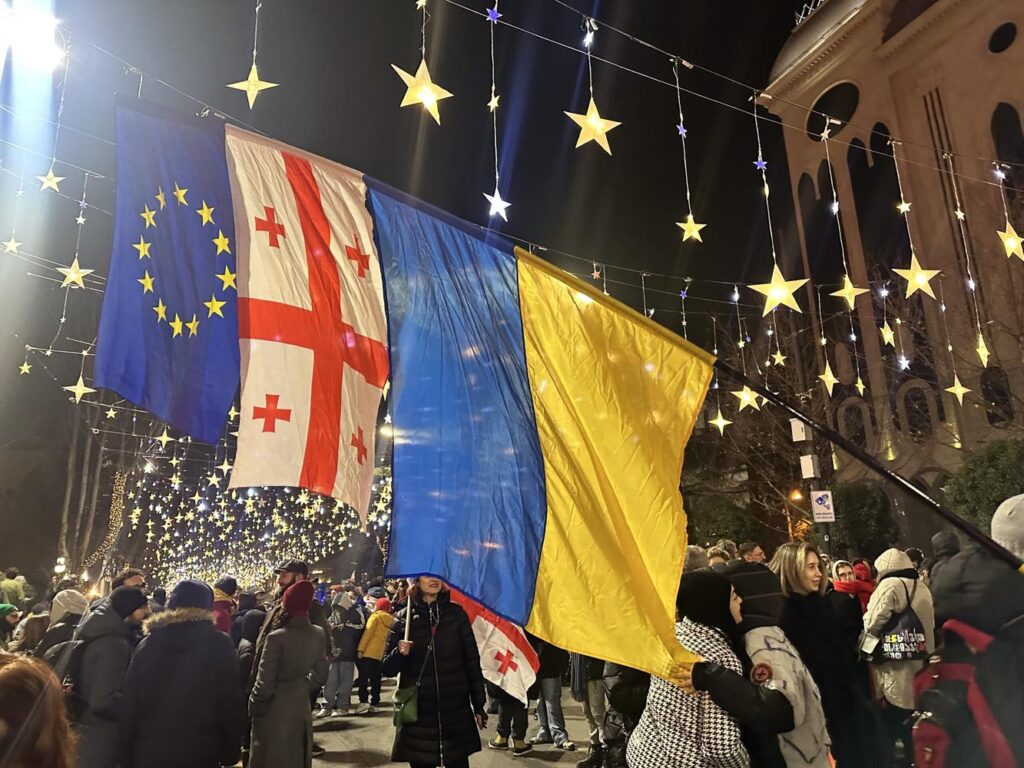
From dependency to independence: The silver lining
The loss of US funding, while painful, may have been necessary medicine. For the first time, Georgian civil society is learning to survive independently.
“Now, first time I see that really viable… society will support independent media and society will support civil society actions,” Robakidze observes. “Whatever happens right now is completely 100% financed by ordinary citizens who are just crowdfunding.”
This grassroots renaissance extends beyond civil society. “We also see for the first time big business also understanding the responsibility that if things go wrong in this part, we can die with them as well.”
The protests themselves represent this new independence. You cannot find “the industry or the sphere where the most prominent people are not part of the protest in Georgia.” All major theaters, singers, and composers have joined the streets. “These are theaters that young people are going to, and you cannot find a ticket for months if you want to attend a theater.”
Even government employees are risking everything. More than 200 public servants were fired simply for posting pro-European statements on Facebook—a purge that backfired by revealing the government’s desperation and creating martyrs.
Global warning: your democracy is next
Georgia’s crisis reflects a global phenomenon that Robakidze calls the “spirit of non-freedom spreading.” The mechanics are eerily familiar across continents.
“A lot of people in the world were living many years thinking that freedom is granted and guaranteed, taking freedom for granted,” she explains. “In Europe, in the US, in the West in general, they had this problem maybe even deeper than the Georgian society has.”
Western societies “allowed in their societies this darkness to spread without reacting to it when it’s needed.”
The warning signs are identical:
- Small compromises that seem manageable
- External funding creating dependency vulnerabilities
- Strategic communication training weaponized against democracy
- Media capture through economic pressure
- Civil society taking freedom for granted.
“Right now weather is the worst for beginner democracies,” she warns. But the crisis is a “wake-up call for not just for us, for societies who want to be democratic and consolidated democracies one day, but for everyone.”
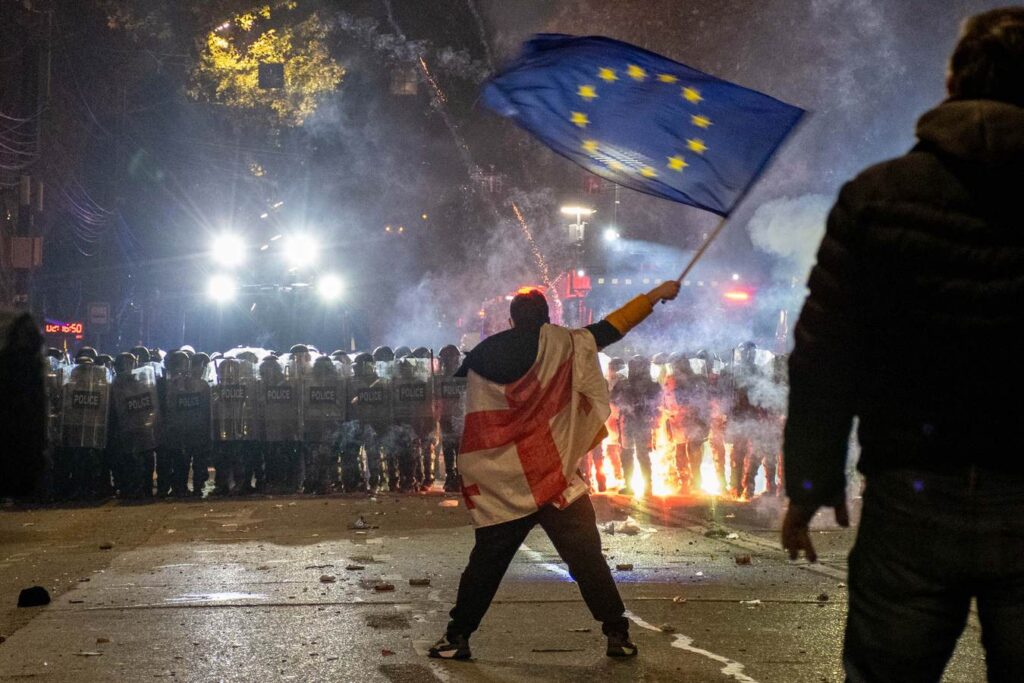
The clock is ticking
As Georgia’s protests continue into their seventh month, the timeline offers a stark warning: democratic collapse can happen faster than anyone imagines. Eighteen months from EU candidate to authoritarian crackdown.
“There is never a bad time to think about your mistakes, and we can never be uncomfortable discussing the elephant in the room, because this elephant will never go anywhere,” Robakidze reflects. “And the only problem that this discussion creates is this uncomfortable feeling, which I think is very important—better experienced earlier than later.”
The uncomfortable truth: external funding made Georgian democracy vulnerable by creating dependency rather than genuine grassroots strength. But losing that crutch may have forced the authentic resistance needed to survive.
Georgia faces its ultimate test—not just of its democratic institutions, but of whether a society that truly tasted freedom can recognize and defeat authoritarianism when it matters most. The answer will determine not just Georgia’s fate, but offer crucial lessons for every democracy grappling with its own “spirit of non-freedom.”
For Robakidze, the fight continues: “We will not let Georgia slide back under Russia’s influence.” The question is whether the world’s other democracies will learn from Georgia’s mistakes before their own 18-month countdown begins.
The world’s largest bank says Ukraine will fail—apparently forgetting Ukraine doesn’t take orders

- JPMorgan assigns Ukrainian reconstruction 2-to-1 odds of failure despite €326 billion in European defense spending
- Ukraine’s Western integration employs 300,000 people through industrial partnerships approaching irreversibility
- Bank’s assessment could become self-fulfilling prophecy by constraining investment flows Ukraine needs to succeed
- Analysis repeats same errors that underestimated Ukrainian resilience in 2022, delaying crucial early support
- Russia spends 7.1% of GDP on military while Ukraine builds permanent institutional ties with the West
When JPMorgan assigned Ukrainian reconstruction 2-to-1 odds of failure, the world’s largest bank wasn’t just making a prediction about Ukraine’s future – it was essentially wagering against the same Ukrainian agency that has consistently defied institutional expectations.
The timing appears particularly significant. By 2025, Ukraine’s Western integration had gained substantial momentum: industrial partnerships employing 300,000 people, €326 billion in European defense spending including Ukraine, and institutional lock-in approaching irreversibility.
But JPMorgan’s pessimistic assessment doesn’t just predict Ukrainian failure – it could help cause it by constraining the very investment flows that enable Ukrainian agency to succeed.
When an institution managing $3.2 trillion makes such assessments, they influence insurance rates, loan guarantees, and foreign direct investment that could determine outcomes.
This isn’t theoretical. In February 2022, Western predictions of Ukrainian collapse created reluctance to provide robust support—ex-Foreign Minister Dmytro Kuleba described how German officials looked at him as if he were “doomed.” This pessimism delayed crucial early assistance, contributing to territorial losses that stronger initial support might have prevented.
JPMorgan’s economic pessimism now threatens similar delays in reconstruction funding.
A documented pattern of misjudgment
The problem is that JPMorgan’s analysis repeats the same analytical errors that made Western institutions so wrong about Ukraine in 2022.
They consistently underestimated Ukrainian resilience while overestimating Russian strategic capabilities. The fundamental mistake is treating Ukraine as a passive object of great power competition rather than an actor shaping its own destiny.
When Russia launched its full-blown invasion in 2022, analysts assumed Ukraine would behave like a typical post-Soviet state—passive, corrupt, waiting for rescue, destined to fall while Russia captures the country in weeks.
Instead, Ukraine chose to fight, mobilize civil society, and transform its institutions while under bombardment.
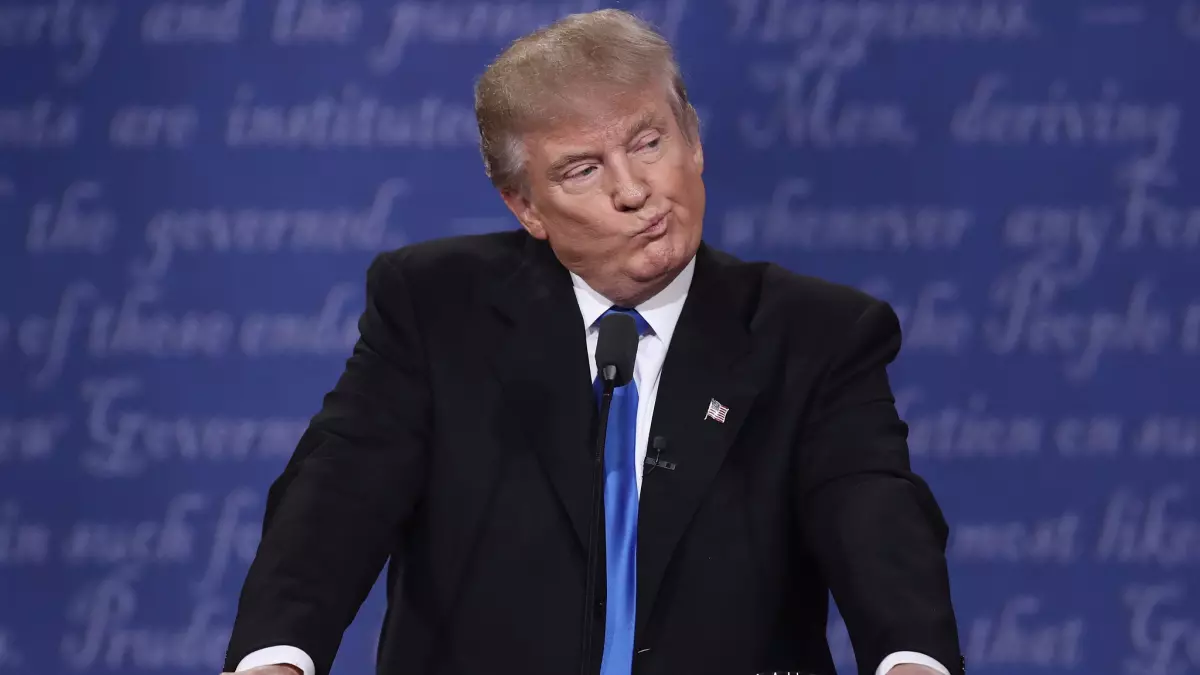
“Dudes with track pants and hunting rifles”: why Ukraine became the West’s most embarrassing blind spot
Just yesterday, Ukrainian forces demonstrated this agency again with coordinated drone strikes against Russian strategic bombers deep inside Russian territory—the kind of operation analysts thought impossible three years ago.
However, in 2022, the false military predictions delayed crucial support, creating a self-fulfilling prophecy that Ukraine continues to defy at enormous cost.
JPMorgan’s current prediction—that Russia has a 2-to-1 chance of dragging Ukraine back into its orbit—repeats this analytical blind spot about Russian durability while overlooking Ukrainian institutional momentum that has proven remarkably resilient under extreme pressure.
JPMorgan’s prediction repeats an analytical blind spot about Russian durability while overlooking Ukrainian institutional resilience and momentum.
The bank’s track record on major predictions raises additional concerns.
When JPMorgan CEO Jamie Dimon predicted an economic “hurricane” in 2022 that never materialized, investors who followed his advice missed significant market gains. When the bank called Bitcoin a “fraud” in 2017 before eventually offering it to clients, the consequences were financial.
Now the stakes are higher—a country fighting for its survival depends on the investment flows their assessment could influence.
JPMorgan’s four-scenario framework
The bank divides Ukraine’s future into scenarios borrowed from other countries’ experiences: “South Korea” (15%), “Israel” (20%), “Georgia” (50%), and “Belarus” (15%).
The structure reveals their pessimism—negative scenarios representing 65% probability of Russian control versus just 35% for successful Western integration.
Their highest-probability Georgia scenario—reverting into the Kremlin’s orbit— draws on sophisticated analysis of institutional anchoring.
The logic flows from Georgia’s experience after 2008: initial Western aid and political support “stopped short of troops and security promises,” leading over time to “political instability and democratic erosion, fostered by creeping Russian influence.”
Eventually, this produced frozen EU accession and adoption of “Kremlin-style foreign agent laws.”
The economic mechanism they identify creates particular concern.
“Risk-averse investors could choose to avoid an unstable, security-fragile environment, limiting foreign direct investment.” High insurance costs and risk premiums could undermine competitiveness, while Ukraine might “re-open vulnerable trade corridors or informal dependencies linked to Russia.”
Their Belarus scenario (15% probability) demonstrates the extreme outcome—complete vassalization where Russia achieves its maximalist demands. The key insight connecting both scenarios: even strong pro-Western sentiment can fade “if not adequately reciprocated by Western institutions.”
Why Ukraine’s trajectory differs fundamentally

JPMorgan’s structural analysis has merit, but applying Georgia’s trajectory to Ukraine overlooks critical differences that make historical analogies misleading guides for political forecasting.
Consider the vulnerabilities that enabled Georgia’s drift:
- Economic dependence: Over 15% of GDP from Russian remittances by 2022-2023
- Limited scale: 3.7 million people, $30.5 billion GDP—manageable for sustained influence operations
- Oligarch capture: Bidzina Ivanishvili’s wealth enabled systematic institutional control
- Civil society erosion: Despite initial protests, “foreign agent” laws were ultimately implemented
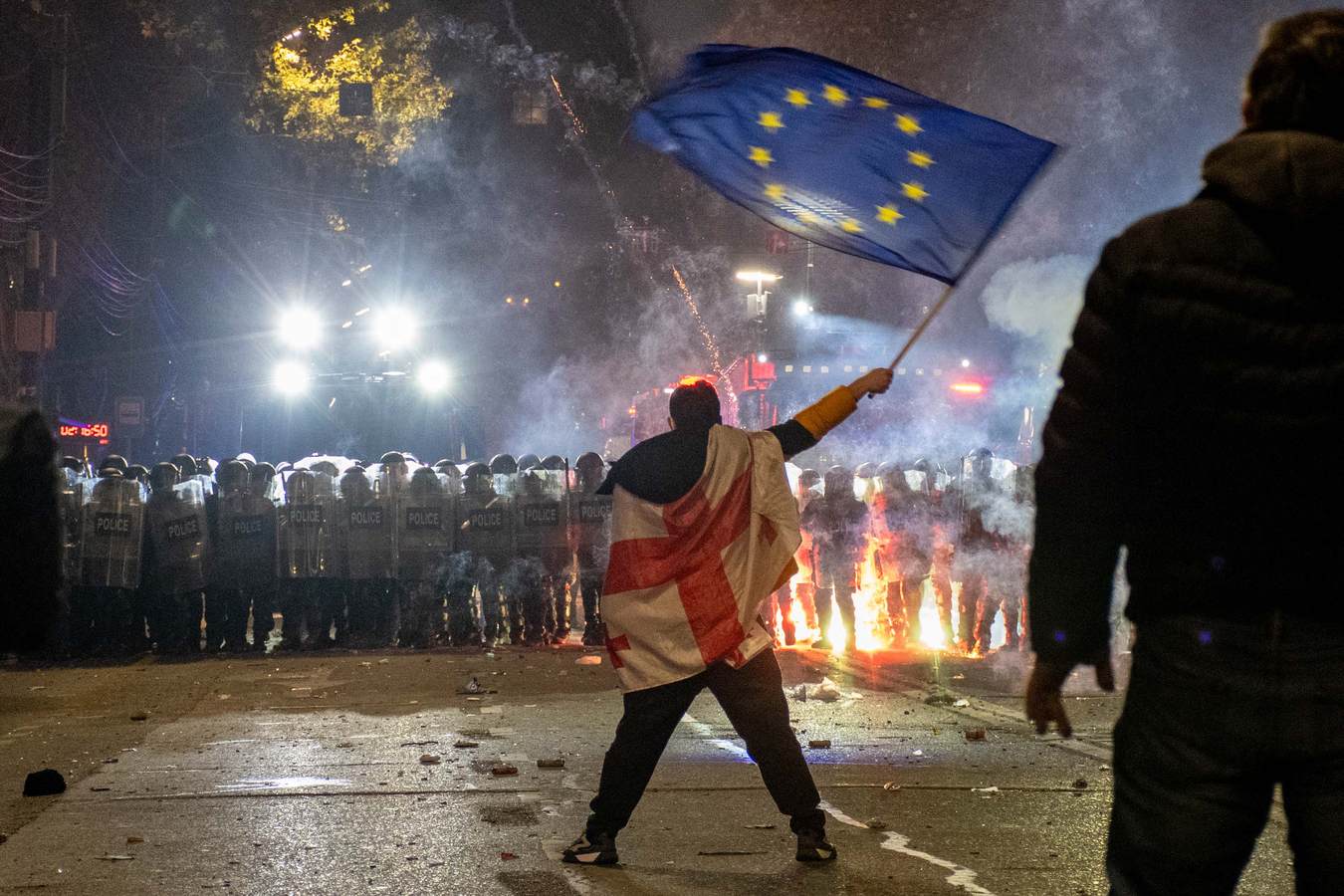
“Not another Russian colony”: Georgia erupts against Moscow’s shadow rule
Ukraine presents fundamentally different structural characteristics:
- Proven mobilization capacity at scale: Ukraine has sustained one million personnel under arms while maintaining government functionality under direct assault—institutional resilience tested at scales Georgia never faced.
- Economic decoupling track record: Unlike Georgia’s increasing Russian economic dependence, Ukraine systematically reduced Russian ties after 2014, creating fundamentally different vulnerability patterns.
- Civil society effectiveness: Belarus demonstrates complete Russian capture when civil society cannot mount sustained resistance. Georgia shows how gradual erosion can succeed despite protests—thousands demonstrated against “foreign agent” laws but ultimately failed to prevent implementation. Ukraine’s trajectory differs markedly: Euromaidan demonstrated not just mobilization capacity, but successful resistance that twice prevented governments from drifting toward Russian influence.
Ukraine has already withstood pressures that gradually captured Georgia and completely overwhelmed Belarus, but at much higher intensity and longer duration.
The critical difference: Ukraine has already withstood pressures that gradually captured Georgia and completely overwhelmed Belarus, but at much higher intensity and longer duration.
However, JPMorgan’s framework assumes Ukraine will eventually succumb to pressures it has already proven capable of resisting at levels that destroyed institutional resistance elsewhere in the post-Soviet space.
Institutional integration approaching irreversibility
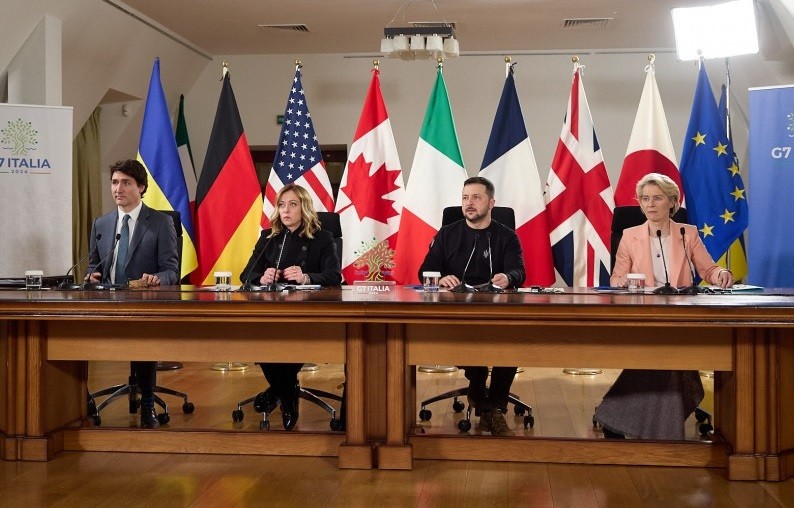
JPMorgan’s scenarios assume current Western support could gradually fade, but examining actual commitments reveals integration approaching irreversibility. This isn’t potential future support being debated—it’s operational infrastructure already employing hundreds of thousands.
- Financial infrastructure creating permanent dependencies: The EU has delivered $158 billion with $54 billion more locked through 2027 for EU accession. $300 billion in frozen Russian assets generate ongoing funding streams—the first €1.5 billion tranche already disbursed with decades of payments planned.
- Industrial integration beyond reversal: Rheinmetall, KNDS, and Nammo have established production facilities in Ukraine. Approximately 500 arms producers now employ nearly 300,000 people. Every Western weapons system creates long-term dependency relationships through spare parts, training, and maintenance contracts.
- Growing military integration: Among Ukraine’s military deliveries from Western partners are 84 Multiple Launch Rocket Systems, 740 howitzers, 78 air defense systems, 939 tanks, and 1,271 armored personnel carriers. This hardware creates permanent dependency chains that lock in decades of partnership. Ukraine’s arms industry achieved 69% revenue growth to $2.2 billion in 2023—the fastest increase ever recorded.
- Security architecture: Twenty-nine Allies and partners have signed bilateral security agreements with Ukraine. The NATO-Ukraine Joint Analysis, Training and Education Centre has officially opened—an institutional integration that Georgia never achieved.
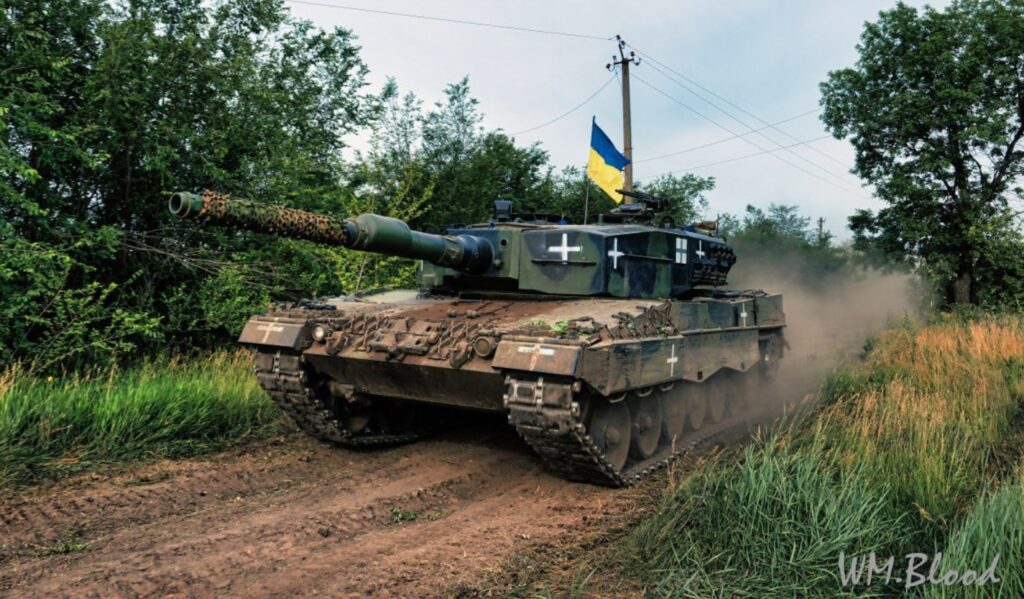
JPMorgan’s concern about Western fatigue deserves serious consideration—democratic societies do struggle with sustained commitments. But their model may underestimate how current integration creates constituencies for continued support.
Each arms factory employing local workers creates lobbying pressure for sustained partnerships. Each EU legal framework integrated into Ukrainian governance creates bureaucratic momentum. Each training program for Ukrainian personnel creates institutional relationships that transcend political cycles.
The contrast with Georgia is instructive: Georgia received aid but never achieved this depth of institutional integration.
By 2008, Georgia had bilateral relationships; by 2025, Ukraine has multilateral institutional embedding that would require deliberate dismantling by dozens of countries simultaneously.
The replacement economy in action
JPMorgan assumes Russian economic pressure will eventually overcome Ukrainian resistance, but examining the underlying economic dynamics reveals a different trajectory emerging.
- Western economic integration with Ukraine is accelerating: According to SIPRI data, European defense spending increased 30% since 2021 to €326 billion—and this rearmament benefits Ukraine through weapons transfers and industrial partnerships, rather than excluding it from Europe’s defense ecosystem. Meanwhile, each round of sanctions against Russia creates permanent market displacement as Western competitors develop their own supply chains and lobbying influence, making reversal increasingly difficult.
- Russian economic sustainability appears increasingly strained: Russia’s military expenditure reached $149 billion in 2024—7.1% of GDP, the highest since the Cold War. This massive military spending comes at the expense of domestic priorities: just 0.87% of GDP goes to healthcare and 0.7% to education. Russia has forced banks to fund half its war costs, requiring businesses to borrow at punitive 21% interest rates that threaten long-term economic viability.
- The contrast in sustainability models is striking: While Ukraine allocates an even higher 34% of GDP to defense, it does so with massive external support that strengthens rather than weakens its economy. Russia burns through domestic resources alone, creating an unsustainable trajectory that favors Ukraine’s strategy of externally supported resistance over Russia’s self-funded pressure campaign.
We’re witnessing a managed demolition of Russian imperial pretensions with Ukraine as both the primary instrument and beneficiary.
What we’re witnessing is a managed demolition of Russian imperial pretensions with Ukraine as both the primary instrument and beneficiary. Every sector where Russia has been sanctioned gets permanently replaced by Western competitors who develop their own lobbying power and political influence.

Russia forced banks to secretly fund half its war costs. Can its economy survive? What does this mean for Ukraine?
Why JPMorgan’s answer may be wrong
JPMorgan deserves credit for identifying a vulnerability that Western analysts often miss: states without firm institutional anchors can drift despite strong popular sentiment. Their insight about the relationship between security guarantees and economic confidence is particularly valuable.
The Georgia analogy captures an important dynamic—how gradual erosion can succeed where direct pressure fails. Their concern about Western fatigue over 5-10 years reflects a genuine understanding of how democratic attention spans work.
Where we disagree is not on the importance of institutional anchoring, but on whether Ukraine has already achieved sufficient integration to make drift unlikely.
The question their framework asks—will Western support prove durable enough?—is the right one. But examining the evidence suggests Ukraine’s anchoring may be stronger and Russian pressure more unsustainable than their model assumes.
Rather than whether Ukraine will drift into Russia’s orbit, the evidence suggests a different dynamic: Russia is the one under unsustainable pressure.
According to the fiscal data, Russia is burning through domestic resources at unprecedented rates while Ukraine builds permanent institutional ties with the West.
Each year of continued conflict accelerates Russia’s technological lag, demographic decline, and economic isolation while strengthening Ukraine’s Western integration.
Ukraine’s strategic orientation isn’t a future possibility being debated in scenario exercises—it’s an accomplished fact being implemented through billions in industrial infrastructure, EU legal frameworks integral to state functioning, and defense partnerships providing both security and economic opportunity.
The real risk
The real risk is that JPMorgan’s assessment becomes reality through specific market mechanisms. Research shows that major financial institutions’ risk assessments create spillover effects on borrowing costs and investment decisions.
When the world’s largest bank assigns Ukrainian reconstruction coin-flip odds of success, that assessment influences concrete decisions: Lloyd’s of London adjusting insurance premiums for Ukrainian operations, development banks requiring higher risk assessments for reconstruction loans, and private equity firms avoiding Ukrainian partnerships despite profitable opportunities.
Financial institutions that bet against Ukrainian agency do so at their own peril. The institutional momentum is already substantial, the Russian pressure increasingly unsustainable. JPMorgan may find they’ve wagered $3.2 trillion in credibility against the same resilience that has already defied their expectations for three years.
The question isn’t whether Ukraine will follow Georgia’s path—it’s whether JPMorgan will recognize their analytical blind spot before their assessment becomes a self-defeating prophecy.
'Serious setback' for democracy — EU condemns Russia-style foreign agents law in Georgia
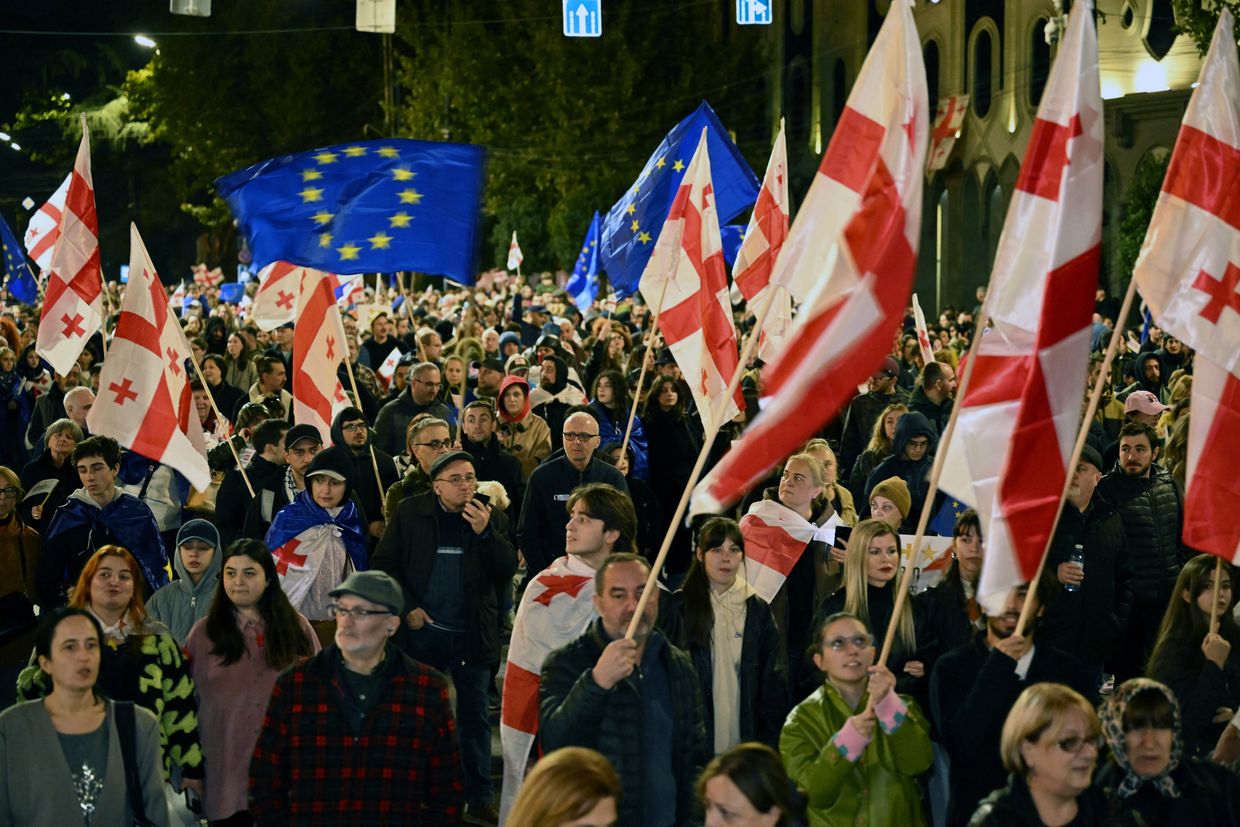
The European Union has condemned Georgia’s Foreign Agents Registration Act, characterizing it as a setback for the country's democratic development and calling on Georgian authorities to reverse democratic backsliding.
In a joint statement published on May 31, top EU officials Kaja Kallas and Marta Kos criticized the Georgian foreign agents law, which requires civil society organizations that receive international funding to register as "foreign agents." The law officially came into effect on May 31.
The EU called the law a "serious setback for the country's democracy" that "represents another aggressive action by the Georgian authorities to suppress dissent, restrict freedoms, and further shrink the space for activists, civil society, and independent media."
The ruling Georgian Dream party, which currently holds a parliamentary majority, passed the contentious law earlier in April 2025, alongside other "repressive measures [that] threaten the very survival of Georgia’s democratic foundations and the future of its citizens in a free and open society."
The statement also noted that Georgia's "accession process has been de facto halted." Georgia first received EU candidate status in December 2023, but its accession process has been hampered by growing authoritarianism in the country.
The EU reiterated its call for Georgian authorities to heeds their citizens' demands for democracy and a European future and urged the "release all unjustly detained journalists, activists, protesters, and political leaders."
"The EU is ready to consider the return of Georgia to the EU accession path if the authorities take credible steps to reverse democratic backsliding," the statement emphasized. "The responsibility lies solely with the Georgian authorities."
Mass protests erupted in Georgia following the contentious parliamentary elections in October 2024, in which Georgian Dream maintained its majority amidst reports of ballot stuffing, intimidation, and other electoral irregularities. Protestors have also cited the foreign agents law as a source of discontent.
Georgia's foreign agents law closely mirrors a similar law that was passed in Russia and weaponized by the Kremlin to clamp down on civil society. First introduced in 2012 and significantly expanded in 2022, Russia's foreign agents law is yet another one of Moscow's primary tools for suppressing criticism.
 The Kyiv IndependentAnna Fratsyvir
The Kyiv IndependentAnna Fratsyvir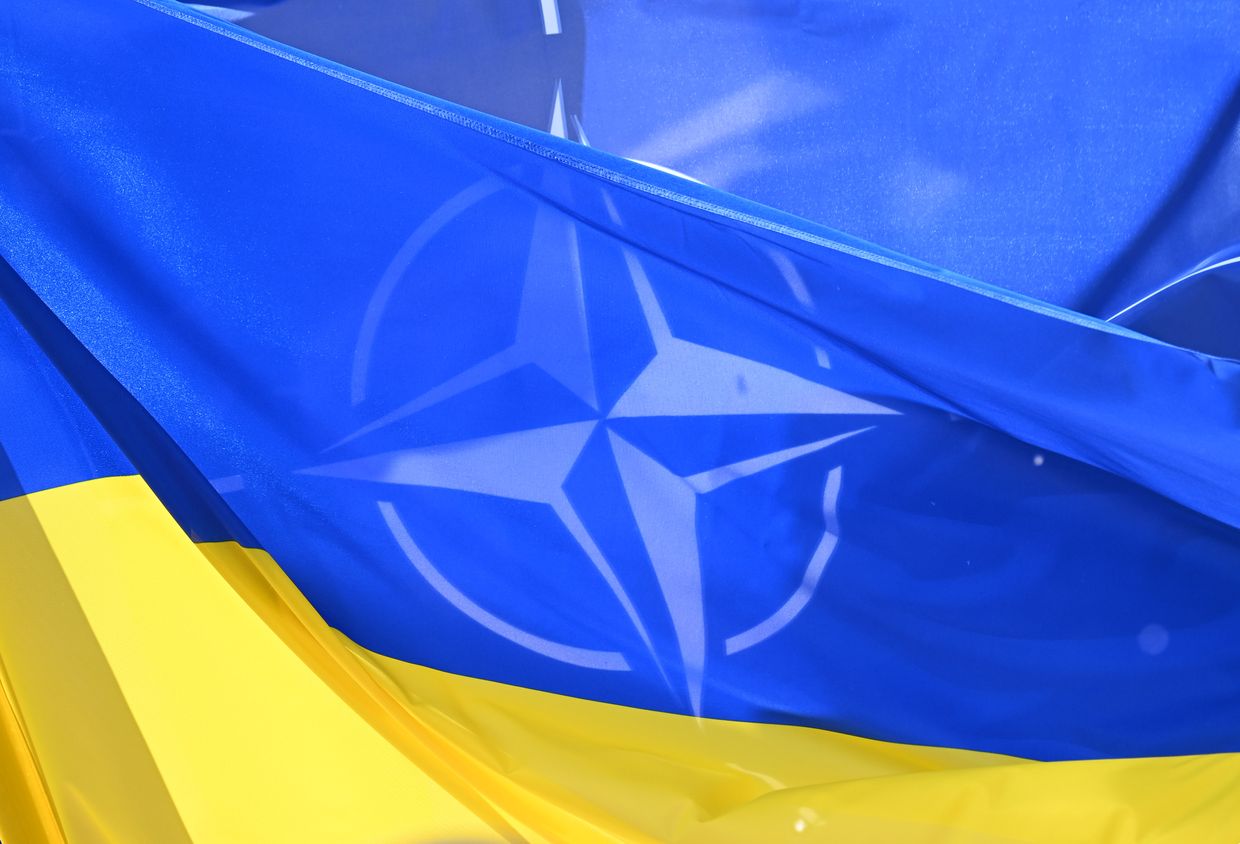
'He was kidnapped' — Georgian opposition leader detained as ruling party continues crackdown on dissent
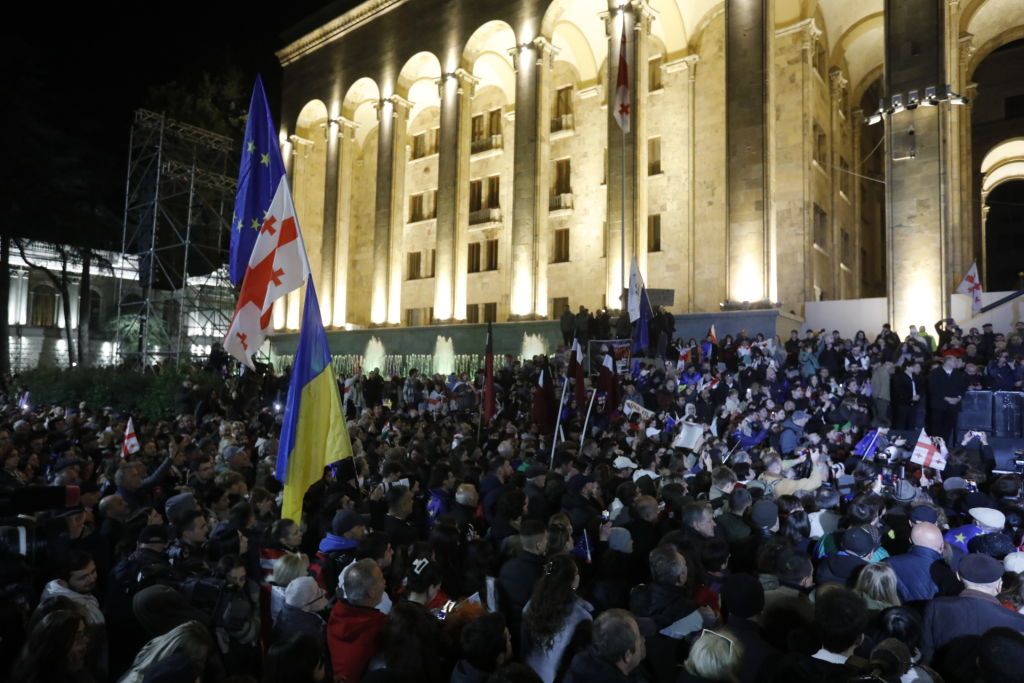
Leader of the Georgian opposition party "Coalition for Change," Nika Melia, was detained by authorities on May 29, NewsGeorgia reported, citing Melia's associates.
Melia is being investigated for refusing to testify before a parliamentary committee probing former President Mikheil Saakashvili's time in power.
The opposition leader was arrested just before he was scheduled to appear on a television show, Melia's associates said.
"I do not know what his detention was connected with. In fact, he was kidnapped. They acted aggressively and without explanation," Melia's lawyer, Georgy Kondakhashvili, claimed.
The ruling "Georgian Dream" party has tightened its grip on power, passing a foreign agents law similar to Russia's. Mass protests erupted in Georgia in 2023 and 2024 in response to moves by authorities, which have isolated the country from the West.
Many opposition figures have not recognized Georgia's ruling party, following disputed parliamentary elections in December 2024.
Melia's commission hearing was postponed from May 29 to May 30, he has refused to attend the proceeding thus far.
Kondakhashvili claims there are no legal grounds for Melia's arrest and says the charges were likely fabricated to forcibly bring the opposition leader to the hearing he has boycotted.
Melia does not view the parliament and commission led by the "Georgian Dream" party as legitimate, and in late April, refused to pay a bail of 50,000 lari ($18,200), NewsGeorgia reported.
Georgia's accession to the EU has been suspended due to the actions of the ruling authorities since the spring of 2024, the European Commission said in October.
Georgia applied for EU candidate status in March 2022, following Ukraine, which applied in February 2022.
 The Kyiv IndependentAnna Fratsyvir
The Kyiv IndependentAnna Fratsyvir